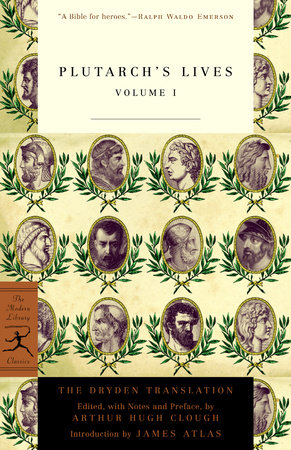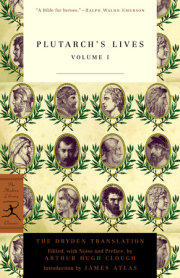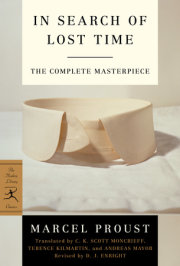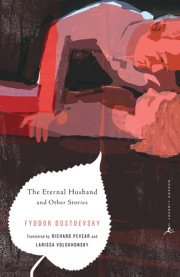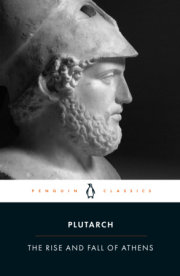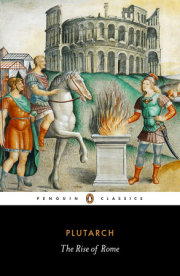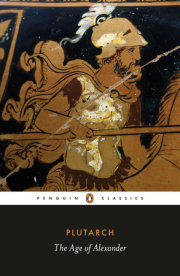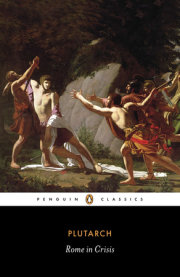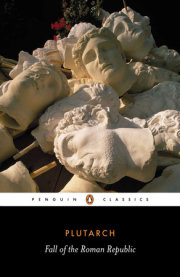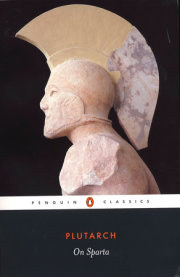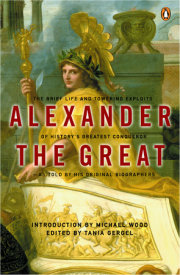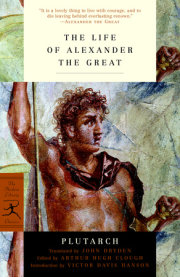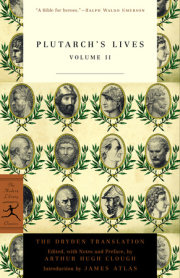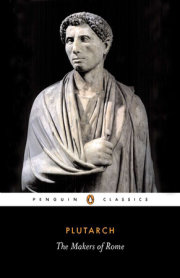As geographers, Sosius, crowd into the edges of their maps parts of the world which they do not know about, adding notes in the margin to the effect, that beyond this lies nothing but the sandy deserts full of wild beasts, unapproachable bogs, Scythian ice, or a frozen sea, so in this work of mine, in which I have compared the lives of the greatest men with one another, after passing through those periods which probable reasoning can reach to and real history find a footing in, I might very well say of those that are farther off: 'Beyond this there is nothing but prodigies and fictions, the only inhabitants are the poets and inventors of fables; there is no credit, or certainty any farther.' Yet, after publishing an account of Lycurgus the lawgiver and Numa the king, I thought I might, not without reason, ascend as high as to Romulus, being brought by my history so near to his time. Considering therefore with myself--
'Whom shall I set so great a man to face?
Or whom oppose? Who's equal to the place?'
(as Aechylus expresses it), I found none so fit as him that peopled the beautiful and far-famed city of Athens, to be set in opposition with the father of the invincible and renowned city of Rome. Let us hope that Fable may, in what shall follow, so submit to the purifying processes of Reason as to take the character of exact history. In any case, however, where it shall be found contumaciously slighting credibility and refusing to be reduced to anything like probable fact, we shall beg that we may meet with candid readers, and such as will receive with indulgence the stories of antiquity.
Theseus seemed to me to resemble Romulus in many particulars. Both of them, born out of wedlock and of uncertain parentage, had the repute of being sprung from the gods.
'Both warriors; that by all the world's allowed.'
Both of them united with strength of body an equal vigour of mind; and of the two most famous cities of the world, the one built Rome, and the other made Athens be inhabited. Both stand charged with the rape of women; neither of them could avoid domestic misfortunes nor jealousy at home; but towards the close of their lives are both of them said to have incurred great odium with their countrymen, if, that is, we may take the stories least like poetry as our guide to the truth.
The lineage of Theseus, by his father's side, ascends as high as to Erechtheus and the first inhabitants of Attica. By his mother's side he was descended of Pelops. For Pelops was the most powerful of all the kings of Peloponnesus, not so much by the greatness of his riches as the multitude of his children, having married many daughters to chief men, and put many sons in places of command in the towns round about him. One of whom named Pittheus, grandfather to Theseus, was governor of the small city of the Troezenians and had the repute of a man of the greatest knowledge and wisdom of his time; which then, it seems, consisted chiefly in grave maxims, such as the poet Hesiod got his great fame by, in his book of Works and Days. And, indeed, among these is one that they ascribe to Pittheus,--
'Unto a friend suffice
A stipulated price;'
which, also, Aristotle mentions. And Euripides, by calling Hippolytus 'scholar of the holy Pittheus,' shows the opinion that the world had of him.
Aegeus, being desirous of children, and consulting the oracle of Delphi, received the celebrated answer which forbade him the company of any woman before his return to Athens. But the oracle being so obscure as not to satisfy him that he was clearly forbid this, he went to Troezen, and communicated to Pittheus the voice of the god, which was in this manner,--
'Loose not the wine-skin foot, thou chief of men,
Until to Athens thou art come again.'
Pittheus, therefore, taking advantage from the obscurity of the oracle, prevailed upon him, it is uncertain whether by persuasion or deceit, to lie with his daughter Aethra. Aegeus afterwards, knowing her whom he had lain with to be Pittheus's daughter, and suspecting her to be with child by him, left a sword and a pair of shoes, hiding them under a great stone that had a hollow in it exactly fitting them; and went away making her only privy to it, and commanding her, if she brought forth a son who, when he came to man's estate, should be able to lift up the stone and take away what he had left there, she should send him way to him with those things with all secrecy, and with injunctions to him as much as possible to conceal his journey from every one; for he greatly feared the Pallentidae, who were continually mutinying against him, and despised him for his want of children, they themselves being fifty brothers, all sons of Pallas.
When Aethra was delivered of a son, some say that he was immediately named Theseus, from the tokens which his father had put under the stone; others that he had received his name afterwards at Athens, when Aegeus acknowledged him for his son. He was brought up under his grandfather Pittheus, and had a tutor and attendant set over him named Connidas, to whom the Athenians even to this time, the day before the feast that is dedicated to Theseus, sacrifice a ram, giving this honour to his memory upon much juster grounds than to Silanio and Parrhasius for making pictures and statues of Theseus. There being then a custom for the Grecian youth, upon their first coming to man's estate, to go to Delphi and offer first-fruits of their hair to the god, Theseus also went thither, and a place there to this day is yet named Thesea, as it is said, from him. He clipped only the fore part of his head, as Homer says the Abantes did. And this sort of tonsure was from him named Theseus. The Abantes first used it, not in imitation of the Arabians, as some imagine, nor of the Mysians, but because they were a warlike people, and used to close fighting, and above all other nations accustomed to engage hand to hand; as Archilochus testifies in these verses:--
'Slings shall not whirl, nor many arrows fly,
When on the plain the battle joins; but swords,
Man against man, the deadly conflict try
As is the practice of Euboea's lords
Skilled with the spear.--'
Therefore that they might not give their enemies a hold by their hair, they cut it in this manner. They write also that this was the reason why Alexander gave command to his captains that all the beards of the Macedonians should be shaved, as being the readiest hold for an enemy.
Aethra for some time concealed the true parentage of Theseus, and a report was given out by Pittheus that he was begotten by Neptune; for the Troezenians pay Neptune the highest veneration. He is their tutelar god; to him they offer all their first-fruits, and in his honour stamp their money with a trident.
Theseus displaying not only great strength of body, but equal bravery, and a quickness alike and force of understanding, his mother Aethra, conducting him to the stone, and informing him who was his true father, commanded him to take from thence the tokens that Aegeus had left, and sail to Athens. He without any difficulty set himself to the stone and lifted it up; but refused to take his journey by sea, though it was much the safer way, and though his mother and grandfather begged him to do so. For it was at that time very dangerous to go by land on the road to Athens, no part of it being free from robbers and murderers. That age produced a sort of men, in force of hand, and swiftness of foot, and strength of body, excelling the ordinary rate and wholly incapable of fatigue; making use, however, of these gifts of nature to no good or profitable purpose for mankind, but rejoicing and priding themselves in insolence, and taking the benefit of their superior strength in the exercise of inhumanity and cruelty, and in seizing, forcing, and committing all manner of outrages upon everything that fell into their hands; all respect for others, all justice, they thought, all equity and humanity, though naturally lauded by common people, either out of want of courage to commit injuries or fear to receive them, yet no way concerned those who were strong enough to win for themselves. Some of these, Hercules destroyed and cut off in his passage through these countries; but some escaping his notice while he was passing by, fled and hid themselves, or else were spared by him in contempt of their abject submission: and after that Hercules fell into misfortune, and, having slain Iphitus, retired to Lydia, and for a long time was there slave to Omphale, a punishment which he had imposed upon himself for the murder: then, indeed, Lydia enjoyed high peace and security, but in Greece and the countries about it the like villainies again revived and broke out, there being none to repress or chastise them. It was therefore a very hazardous journey to travel by land from Athens to Peloponnesus; and Pittheus, giving him an exact account of each of the robbers and villains, their strength, and the cruelty they used to all strangers, tried to persuade Theseus to go by sea. But he, it seems, had long since been secretly fired by the glory of Hercules, held him in the highest estimation, and was never more satisfied than in listening to any that gave an account of him; especially those that had seen him, or had been present at any action or saying of his. So that he was altogether in the same state of feeling as, in after ages, Themistocles was, when he said that he could not sleep for the trophy of Miltiades; entertaining such admiration for the virtue of Hercules, that in the night his dreams were all of that hero&rsquos actions, and in the day a continual emulation stirred him up to perform the like. Besides, they were related, being born of cousins-german. For Aethra was daughter of Pittheus, and Alcmena of Lysidice; and Lysidice and Pittheus were brother and sister, children of Hippodamia and Pelops. He thought it therefore a dishonourable thing, and not to be endured, that Hercules should go out everywhere, and purge both land and sea from wicked men, and he himself should fly from the like adventures that actually came in his way; disgracing his reputed father by a mean flight by sea, and not showing his true one as good evidence of the greatness of his birth by noble and worthy actions, as by the token that he brought with him the shoes and the sword.
With this mind and these thoughts, he set forward with a design to do injury to nobody, but to repel and revenge himself of all those that should offer any. And first of all, in a set combat, he slew Periphetes, in the neighbourhood of Epidaurus, who used a club for his arms, and from thence had the name of Corynetes, or the club-bearer; who seized upon him, and forbade him to go forward in his journey. Being pleased with the club, he took it, and made it his weapon, continuing to use it as Hercules did the lion's skin, on whose shoulders that served to prove how huge a beast he had killed; and to the same end Theseus carried about him this club; overcome indeed by him, but now in his hands, invincible.
Passing on further towards the Isthmus of Peloponnesus, he slew Sinnis, often surnamed the Bender of Pines, after the same manner in which he himself had destroyed many others before. And this he did without having either practised or ever learnt the art of bending these trees, to show that natural strength is above all art. This Sinnis had a daughter of remarkable beauty and stature, called Perigune, who, when her father was killed, fled, and was sought after everywhere by Theseus; and coming into a place overgrown with brushwood, shrubs, and asparagus-thorn, there, in a childlike innocent manner, prayed and begged them, as if they understood her, to give her shelter, with vows that if she escaped she would never cut them down nor burn them. But Theseus calling upon her, and giving her his promise that he would use her with respect, and offer her no injury, she came forth, and in due time bore him a son, named Melanippus; but afterwards was married to Deioneus, the son of Eurytus, the Oechalian, Theseus himself giving her to him. Ioxus, the son of this Melanippus, who was born to Theseus, accompanied Ornytus in the colony that he carried with him into Caria, whence it is a family usage amongst the people called Ioxids, both male and female, never to burn either shrubs or asparagus-thorn, but to respect and honour them.
Copyright © 2000 by Plutarch. All rights reserved. No part of this excerpt may be reproduced or reprinted without permission in writing from the publisher.

